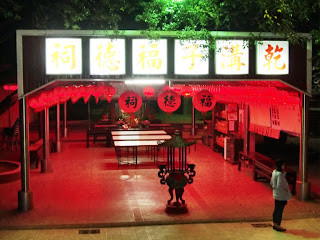My daughter this morning in her devil costume for Halloween, the same one she wore last year. Amber likes this outfit so much she even kept it on when her mother took her to the clinic this evening to get some medicine for a small cold she has recently come down with. Happy Halloween to one and all!
And speaking of which, the following comment appeared on Facebook the other day:
"With all the party signs, decorations and costumes I've seen today, I think Halloween must be celebrated more in Taiwan than anywhere."
The person who wrote the above isn't American or Canadian, so it's likely that he/she has never experienced a genuine Halloween. But the comment did remind me of something unrelated to ghosts, goblins and pumpkins - the Bubble phenomenon. I blogged about this in an entry on Sponge Bear a couple of months ago - namely, the tendency for some Western residents on this island to assume that what they're doing, feeling, hearing and seeing in Taiwan must somehow be uniquely...um, unique. In fact, much of this so-called uniqueness can be found elsewhere in East and Southeast Asia, but ignorance is often bliss in the case of the Bubble People. There's no harm, and thus no foul, in any of this, but it does get annoying after a while reading about the same ad nauseum testimonials on how special Taiwan and the Taiwanese are.
What I forgot to point out back in that August diatribe is that there exists a sub-species of the Bubble People who reside in Taipei, the capital and largest city on Ilha Formosa. These folks tend to assume that what they're doing, feeling, hearing and seeing in T'aipei 台北 isn't unique, but actually representative of the island of Taiwan of a whole. Therefore, when one sees colorful Halloween decorations and costumes on the streets of the metropolis, it must mean the country as a whole is doing the exact same thing. The only problem is that out here in the hinterlands, aka The Real Taiwan, or the place where 90% of the Taiwanese population resides, you would be hard-pressed to find any signs of Halloween other than at some kindergartens and cram schools.
On social websites such as Facebook, or in discussion forums such as Lonely Planet's Thorn Tree or Forumosa, one can read countless comments and postings describing a cosmopolitan, fashionable and thoroughly modern land known as "Taiwan" that sounds almost completely alien to the provincialism and sheer ugliness that I encounter on an almost daily basis out in the Taiwan where I reside (which happens to be in the suburbs of the third-largest city on this island). Replace the word "Taiwan" in these descriptions with "Taipei", and things immediately become clear. Yes, Taipei can be a very appealing city, and certainly a very comfortable one for Western expats, with all mod cons and many of the familiar trappings of home, but with just enough exoticism to impress the folks and friends back home (or when they come to visit). And it should be, for Taipei:
- receives a disproportionate share of cash from the central government in comparison with other cities, resulting in plenty of funds to be spent on parks, bikeways, mass transportation and urban beautification projects;
- and by hosting the best schools, and benefiting from its location as the headquarters for many domestic as well as international companies, attracts the best and the brightest - people who have had more dealings with non-Taiwanese and are thus more open to different things, as well as being more likely to have spent time abroad and therefore more demanding in their expectations of what a capital city should (or shouldn't) be.
Out here in the rest of Taiwan, the situation is a wee bit different. Things are not as well-planned, the architecture is more hideous to look at and it's more difficult to track down things from home. The area where I live has hundreds of eateries to choose from, but other than watered-down offerings of Japanese or Italian cuisine or the ubiquitous fast-food outlets, trying to find food that isn't Chinese or Taiwanese in origin can be a major undertaking.
Taipei is Taipei, and Taiwan is Taiwan, and quite often the twain doesn't meet. I just wish some of my fellow expats can remember that the next time they marvel in how wonderful life is in the big city.
Some good news for those folks in Taiwan who are obsessed with beating the Koreans: according to this Kyōdō News 共同通信社 article, Sony to end LCD panel venture with Samsung, tap cheaper sources, from today's Japan Times ジャパンタイムズ:
"Sony Corp. ソニー株式会社 is in talks to terminate its joint venture with South Korea's
Samsung Electronics Co. for the production of liquid crystal displays
for televisions...Sony has decided to increase procurement of cheap displays from
Taiwanese and other manufacturers rather than focusing on the joint
venture."
In the zero sum game of relations between the southern half of the divided Korean peninsula and the renegade province of China, South Korea's loss is Taiwan's gain.


















































